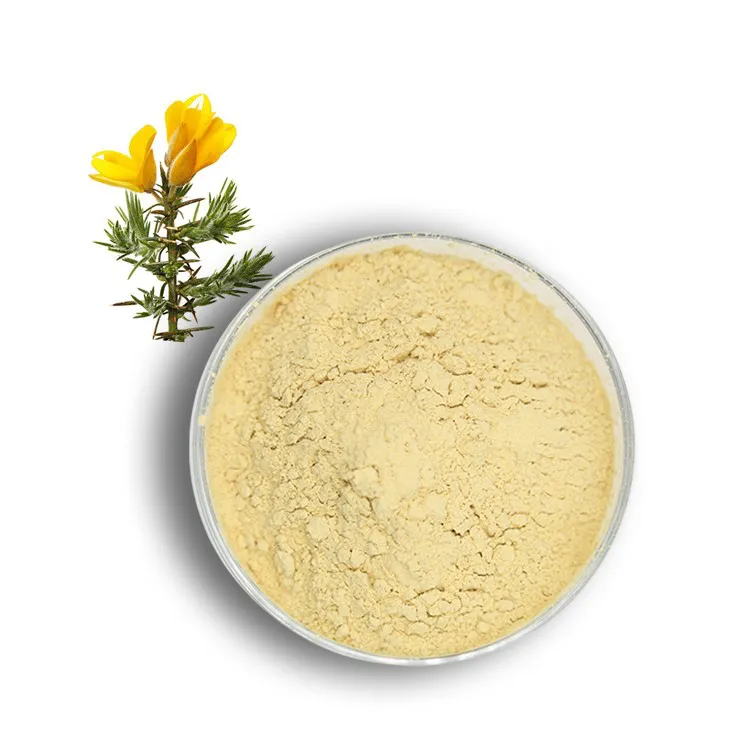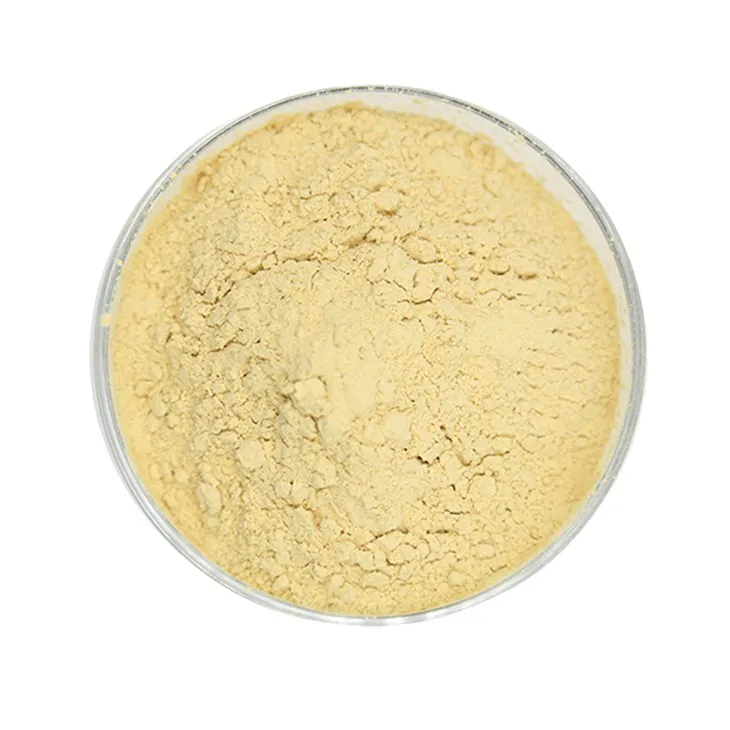- 0086-571-85302990
- sales@greenskybio.com
Genistein in Focus: A Comprehensive Overview of Its Role in Modern Health and Medicine
2024-07-04

1. Introduction to Genistein
Genistein is a well - known isoflavone that has gained significant attention in the fields of health and medicine. It is a natural compound that can be found in a variety of plants, with soybeans being one of the most prominent sources. Genistein has a unique chemical structure that endows it with a range of biological activities, which have been the subject of extensive scientific research in recent years.

2. Genistein in Plants
2.1 Occurrence in Soybeans
Soybeans are a rich source of genistein. The plant synthesizes this isoflavone as part of its secondary metabolite production. Genistein in soybeans is thought to play a role in plant defense mechanisms against pests and environmental stresses. It is present in various parts of the soybean plant, including the seeds. The amount of genistein in soybeans can vary depending on factors such as the soybean variety, growing conditions, and processing methods.2.2 Other Plant Sources
While soybeans are the major source, genistein can also be found in other plants. For example, it has been detected in some legumes and certain species of ferns. However, the concentration in these sources is generally much lower compared to soybeans.
3. Hormonal Regulation by Genistein
3.1 Interaction with Estrogen Receptors
One of the most studied aspects of genistein is its potential role in hormonal regulation, particularly its interaction with estrogen receptors. Genistein has a structure that is somewhat similar to estrogen. It can bind to estrogen receptors, both ER - alpha and ER - beta. This binding can have different effects depending on the tissue type. In some tissues, such as breast tissue, genistein may act as a weak estrogen agonist, while in others, it may act as an antagonist. This dual activity has led to much research on its potential use in hormonal - related disorders.3.2 Impact on Menopausal Symptoms
During menopause, women experience a decline in estrogen levels, which can lead to various symptoms such as hot flashes, mood swings, and bone loss. Genistein has been investigated for its potential to alleviate these symptoms. Some studies suggest that its estrogen - like activity may help in reducing the frequency and severity of hot flashes. However, more research is needed to fully understand its effectiveness and safety in this regard.
4. Genistein as an Antioxidant
4.1 Oxidative Stress in the Body
Oxidative stress occurs when there is an imbalance between the production of reactive oxygen species (ROS) and the body's antioxidant defense mechanisms. ROS can cause damage to cells, proteins, and DNA, which is associated with the development of various diseases, including cardiovascular diseases, neurodegenerative disorders, and cancer.4.2 Antioxidant Mechanisms of Genistein
Genistein has antioxidant properties that can help combat oxidative stress. It can scavenge free radicals, which are highly reactive molecules that contribute to oxidative damage. Genistein also has the ability to up - regulate the body's endogenous antioxidant enzymes, such as superoxide dismutase (SOD) and glutathione peroxidase (GPx). By enhancing the antioxidant defense system, genistein may play a role in preventing or delaying the onset of diseases related to oxidative stress.
5. Anti - Inflammatory Effects of Genistein
5.1 Chronic Inflammation and Disease
Chronic inflammation is a key factor in the development of many diseases, including arthritis, diabetes, and certain cancers. Inflammatory processes involve the activation of immune cells and the release of inflammatory mediators such as cytokines and chemokines.5.2 Genistein's Anti - Inflammatory Actions
Genistein has been shown to have anti - inflammatory effects. It can inhibit the activation of inflammatory cells, such as macrophages and neutrophils. Additionally, it can suppress the production of inflammatory mediators. For example, it has been found to reduce the levels of interleukin - 6 (IL - 6) and tumor necrosis factor - alpha (TNF - α), two important pro - inflammatory cytokines. These anti - inflammatory actions of genistein make it a potential candidate for the prevention and treatment of chronic inflammatory diseases.6. Genistein in Cancer Prevention and Treatment
6.1 Cancer Cell Growth and Proliferation
Studies have suggested that genistein can interfere with cancer cell growth and proliferation. It can act on multiple pathways involved in cell cycle regulation. For example, it may inhibit the activity of cyclin - dependent kinases (CDKs), which are key regulators of the cell cycle. By disrupting the cell cycle, genistein can prevent cancer cells from dividing and multiplying.6.2 Genistein and Apoptosis
Apoptosis, or programmed cell death, is a crucial mechanism for eliminating abnormal cells, including cancer cells. Genistein has been shown to promote apoptosis in cancer cells. It can activate apoptotic pathways by modulating the expression of genes involved in apoptosis, such as Bcl - 2 family genes. In addition, genistein can also enhance the sensitivity of cancer cells to chemotherapy and radiotherapy, potentially improving the efficacy of cancer treatment.6.3 Clinical Studies and Future Perspectives
Although pre - clinical studies have shown promising results regarding genistein's role in cancer prevention and treatment, more clinical studies are needed. Some early - stage clinical trials have been conducted, but larger and more comprehensive studies are required to determine its true potential in cancer management. Future research may also focus on developing novel formulations or delivery systems of genistein to improve its bioavailability and therapeutic efficacy.7. Genistein and Cardiovascular Health
7.1 Lipid Metabolism
Genistein has been shown to have an impact on lipid metabolism. It can lower blood lipid levels, particularly LDL - cholesterol (the "bad" cholesterol). This effect may be due to its ability to regulate genes involved in lipid synthesis and transport. By improving lipid profiles, genistein may contribute to reducing the risk of cardiovascular diseases.7.2 Vascular Function
Another aspect of genistein's role in cardiovascular health is its effect on vascular function. It can improve endothelial function, which is crucial for maintaining normal blood vessel dilation and blood flow. Genistein can stimulate the production of nitric oxide (NO) in endothelial cells, which helps in relaxing blood vessels. Additionally, it may also have anti - atherosclerotic properties by reducing inflammation and oxidative stress in the blood vessels.8. Genistein and Bone Health
8.1 Osteoporosis and Bone Metabolism
Osteoporosis is a common bone disease characterized by low bone mass and increased risk of fractures. Bone metabolism is a complex process involving bone formation by osteoblasts and bone resorption by osteoclasts.8.2 Genistein's Role in Bone Health
Genistein has been shown to have beneficial effects on bone health. It can stimulate osteoblast activity, promoting bone formation. At the same time, it can also inhibit osteoclast activity, reducing bone resorption. These dual actions on bone cells may help in maintaining bone density and strength, potentially preventing or treating osteoporosis. However, more research is needed to fully understand its long - term effects on bone health and its optimal dosage for this purpose.9. Bioavailability and Safety of Genistein
9.1 Absorption, Distribution, Metabolism, and Excretion
The bioavailability of genistein is an important factor in determining its effectiveness in vivo. Genistein is absorbed in the small intestine, and its absorption can be influenced by factors such as food matrix and gut microbiota. Once absorbed, it is distributed to various tissues in the body and is metabolized mainly in the liver. The metabolites of genistein may also have biological activities. Genistein is excreted mainly through the urine and feces.9.2 Safety Considerations
Generally, genistein is considered safe when consumed in normal dietary amounts. However, at high doses, there may be some potential risks. For example, in some animal studies, high - dose genistein has been associated with hormonal disruptions. In humans, more research is needed to fully assess the safety of high - dose genistein supplementation. It is also important to consider potential interactions with medications, especially those that interact with estrogen receptors or affect liver metabolism.10. Conclusion
Genistein is a compound with a wide range of potential health benefits. Its roles in hormonal regulation, antioxidant activity, anti - inflammatory effects, cancer prevention and treatment, cardiovascular health, bone health, and more have been the subject of extensive research. However, more studies are needed to fully understand its mechanisms of action, optimize its use, and ensure its safety. A comprehensive understanding of genistein is essential for its optimal utilization in modern health and medicine, whether through dietary intake or potential therapeutic applications.
FAQ:
What are the main sources of Genistein?
Genistein is mainly found in various plants, with soybeans being a particularly rich source. It can also be present in other legumes and some plant - based foods.
How does Genistein contribute to hormonal regulation?
Genistein has the potential to influence estrogen - related processes. It can interact with estrogen receptors in the body, either mimicking or modulating the effects of estrogen, which helps in hormonal balance.
What makes Genistein's antioxidant capabilities important?
Oxidative stress can damage cells and tissues in the body, leading to various health problems. Genistein's antioxidant capabilities are crucial as they can neutralize harmful free radicals, reducing the risk of oxidative damage and associated diseases.
How do Genistein's anti - inflammatory effects benefit health?
Chronic inflammation is linked to many diseases such as heart disease, diabetes, and arthritis. Genistein's anti - inflammatory effects can help reduce this inflammation, potentially preventing or alleviating these disease conditions.
What is the mechanism of Genistein in cancer prevention and treatment?
Studies suggest that Genistein can interfere with cancer cell growth and proliferation. It may act on various molecular pathways in cancer cells, such as inhibiting enzymes involved in cell division or inducing apoptosis (programmed cell death) in cancer cells.
Related literature
- Genistein and Health: A Review of the Current Evidence"
- "The Role of Genistein in Hormonal Health: Recent Research Findings"
- "Genistein's Antioxidant and Anti - Inflammatory Properties: Implications for Disease Prevention"
- "Genistein in Cancer Therapy: A Promising Natural Compound"
- ▶ Hesperidin
- ▶ citrus bioflavonoids
- ▶ plant extract
- ▶ lycopene
- ▶ Diosmin
- ▶ Grape seed extract
- ▶ Sea buckthorn Juice Powder
- ▶ Beetroot powder
- ▶ Hops Extract
- ▶ Artichoke Extract
- ▶ Reishi mushroom extract
- ▶ Astaxanthin
- ▶ Green Tea Extract
- ▶ Curcumin Extract
- ▶ Horse Chestnut Extract
- ▶ Other Problems
- ▶ Boswellia Serrata Extract
- ▶ Resveratrol Extract
- ▶ Marigold Extract
- ▶ Grape Leaf Extract
- ▶ blog3
- ▶ blog4
- ▶ blog5
-
Curcumin
2024-07-04
-
Berberis aristata Extract
2024-07-04
-
Horse Chestnut Extract
2024-07-04
-
Clove Powder
2024-07-04
-
Lemon Extract
2024-07-04
-
Polygonum multiflorum extract
2024-07-04
-
Bilberry Extract
2024-07-04
-
Alisma Extract
2024-07-04
-
Gynostemma pentaphyllum extract
2024-07-04
-
Phyllanthus Emblica Extract
2024-07-04





















